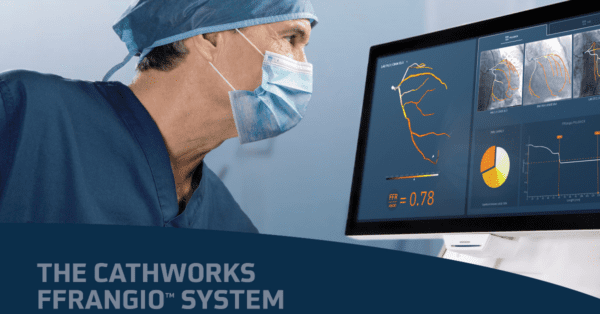|
Medtronic & CathWorks Tighten Ties | Smart Wars
July 15, 2022
|
|
|

|
|
Together with
|

|
|
|
“The tragedies of life are largely arterial.”
|
|
Sir William Osler, Diseases of the Circulatory System, 1908
|
|

|
|
In a new strategic partnership, Medtronic is expanding its relationship with coronary artery disease startup CathWorks and securing the option to acquire the company for up to $585M.
The CathWorks FFRangio System is at the heart of the new alliance. In contrast to traditional fractional flow reserve (FFR) techniques, the AI-powered FFRangio solution delivers multi-vessel FFR results from routine angiograms, eliminating the need for invasive pressure wires or drug stimulations. Data published in JACC in 2020 showed strong performance for FFRangio, which achieved a diagnostic accuracy of 93%.
Medtronic has kept a close eye on CathWorks since 2018, when it made a minority investment in the Israeli startup. Since then, CathWorks has secured FDA clearance for the FFRangio System, locked in two funding rounds totaling $60M, and expanded commercial availability to Japan.
Medtronic, recognizing the momentum, is now taking the alliance to new heights:
- Medtronic will invest an additional $75M in CathWorks.
- Together, they will co-promote the FFRangio System in the US, Europe, and Japan.
- If CathWorks achieves certain milestones, Medtronic will have the option to acquire the company for up to $585M.
- An interesting provision in the partnership gives CathWorks the ability to compel Medtronic to acquire the company if Medtronic chooses not to exercise its option.
The Takeaway
Medtronic is tightening its ties to CathWorks through a $75M investment while laying the groundwork for a future acquisition. The partnership appears to make sense for both sides. Medtronic gains a new AI solution to improve the diagnosis of CAD patients, and CathWorks scores a partner with a strong commercial team and large existing customer base.
|




|
|
Protecting Your Cardiovascular Imaging Data
Are you sure about your cardiovascular imaging data security? Tune-in to this Change Healthcare webinar discussing how hospital systems and healthcare providers can strategically improve their data security.
|
|
Pivoting to Population Health AI
Check out this interview with Nanox AI strategy leader, Dr. Orit Wimpfheimer, where she discusses building an international telerad practice, what’s wrong with triage AI, and pivoting to population health AI.
|
|
- Smart Wars: Analysis from the SMART WARS study revealed that AliveCor’s KardiaBand device more reliably identifies AFib than the Apple Watch 4. Using data from 125 older adults, researchers found that KardiaBand provided more accurate heart rhythm assessments (74% vs. 65%), higher sensitivity (89% vs. 19%), and better negative predictive value (97% vs. 82%) than the Apple solution. Calling it a “war” isn’t a complete exaggeration– AliveCor and Apple have been fighting a legal battle since May 2021 over single-lead ECG technology patent rights.
- CMS Reimbursement Cuts: CMS intends to further cut reimbursements for SVT, VT, and AF ablations and other cardiac services in 2023. The rule is expected to decrease payments to cardiologists by approximately 1% (PFS conversion factor: from $34.60 to $33.08), although rates will vary widely by subspecialty. The American College of Cardiology described the proposal as a “continuation of a troubling trend.” Cardiologists on Twitter were also pretty upset.
- Heart Inflammation & COVID Vaccine: Canada-based researchers synthesized data from 46 studies (over 8,000 patients) and detailed the incidence of myocarditis following COVID vaccination. They found that young adult males 12-17 years old are at the highest risk, with an incidence of 50 to 139 cases per million. Still, not getting vaccinated appears to be riskier for most people. This study points out that young males who contract COVID are up to 6 times more likely to develop myocarditis than those who have received the vaccine.
- Artificial Hearts: A study published in Science highlighted Harvard researchers’ groundbreaking manufacturing method used to engineer human heart models. Researchers used the technique– focused rotary jet spinning– to establish that helical tissue patterns play an essential role in cardiac performance. However, scientists must still overcome physiologic barriers before artificial hearts are ready for medicinal use.
- Pediatric Transplant Mortality: Among children who experienced a stroke during their first heart transplant procedure, Black children were three times more likely to die after six months than White children. Boston-based researchers found that among 255 pediatric heart transplant recipients who experienced a perioperative stroke, mortality rates were similar between Black and White children in the first six months post-op, but then diverged. Researchers speculate that access disparities are responsible for the discrepancy.
- Ancora Achievement: Medical device manufacturer Ancora Heart announced that its AccuCinch Ventricular Restoration System received FDA Breakthrough Device Designation. The AccuCinch System is a minimally invasive transcatheter therapy designed to improve left ventricular structure for patients with symptomatic HFrEF, and the new designation will help the company work toward a full commercial roll-out.
- Myocardial Ischemia Treatment: A new study in JACC shows that nuclear stress tests may help physicians determine how best to treat myocardial ischemia (MI) patients. Using stress test data from 43,000 participants (11.4 year median follow-up), researchers found that patients most likely to experience mortality benefits from myocardial revascularization were those with moderate or severe MI during stress testing. Revascularization did not benefit those who experienced only mild MI during stress testing.
- Rock Health’s H1 Slowdown: Rock Health confirmed that the first half of 2022 brought a significant slowdown in digital health venture funding, falling to $10.3B across 329 rounds. Digital health startups are now projected to bring in $21B through all of 2022, far below 2021’s record-breaking levels but still well above 2020’s total funding ($29.1B & $14.7B). Cardiovascular care remained among the top-funded indications in H1 ($600M), helped by home heart monitoring startup Biofourmis’ $300M Series D round.
- CTPA Pulmonary Hypertension Detection: A new Radiology study suggests that CTPA-based assessments of pulmonary vessel volumes may help identify patients with pulmonary hypertension (PH). Researchers performed quantitative CTPA assessments on 1,823 patients (1,593 w/ PH, 230 controls), finding that patients with pulmonary arterial hypertension and PH associated with left-sided heart disease also had lower average pulmonary vessel volumes. However, the PH patients and healthy controls had similar peel vessel volumes.
- Hospital Margins Update: Kauffman Hall’s latest National Hospital Flash Report shows that rising supply and labor costs contributed to the fifth consecutive month of negative hospital margins, which averaged -0.33% in May. Although gross operating revenues grew by 3% with a 4.8% month-over-month rise in patient days, the increase was not enough to offset the rising costs that are expected to keep margins below pre-pandemic levels for the rest of the year.
- Cuffless BP Monitoring: LiveMetric received FDA 510(k) clearance for its LiveOne cuffless blood pressure monitor that uses a sensor array over the radial artery to produce a waveform that can be used to determine systolic and diastolic blood pressure. Although LiveOne is currently intended for clinical settings, sensor-based blood pressure monitors are a holy grail for consumer-grade smartwatch manufacturers, and LiveMetric’s new clearance brings the technology closer to a mass market debut.
|
|
Transforming Cardiac Care
Atherosclerosis is the strongest predictor of heart attacks — but what are the clinical thresholds for diagnosis and treatment? Tune in to Cleerly’s on-demand webinar discussing how plaque staging can support more precise treatment based on an individual’s atherosclerotic phenotype.
|
|
Us2.ai and EchoNous Integrate
Us2.ai’s echocardiography reporting automation solution is being integrated into the EchoNous Kosmos ultrasound platform, creating the most powerful diagnostic “power tool” ever created for the hand-carried POCUS market.
|
|
|
|
|